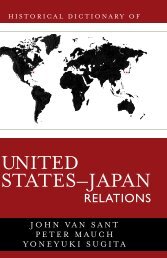Private Academies of Chinese Learning in Meiji Japan: The Decline ...
Private Academies of Chinese Learning in Meiji Japan: The Decline ...
Private Academies of Chinese Learning in Meiji Japan: The Decline ...
You also want an ePaper? Increase the reach of your titles
YUMPU automatically turns print PDFs into web optimized ePapers that Google loves.
228 PRIVATE ACADEMIES OF CHINESE LEARNING IN MEIJI JAPANWith the demise <strong>of</strong> the historical juku an ideal image <strong>of</strong> a jukucame <strong>in</strong>to be<strong>in</strong>g, which <strong>in</strong>fluenced collective memories. Societiesconstruct memories accord<strong>in</strong>g to their needs, and such memoriesare a product <strong>of</strong> relationships between private memory andpublic representation, between past experience and presentconcerns. 53 Personal recollections <strong>of</strong>ten fit themselves <strong>in</strong>to theframework <strong>of</strong> this constructed memory, even if the experience <strong>of</strong>the <strong>in</strong>dividual was <strong>in</strong> fact different. This is what appears to havehappened with the authors <strong>of</strong> the articles <strong>in</strong> Nihon oyobi Nihonj<strong>in</strong>.<strong>The</strong> way they remembered juku shows how personal experience<strong>of</strong> juku fades <strong>in</strong>to the background, while the public juku-imageand the concern with the contemporary crisis <strong>in</strong> educationdom<strong>in</strong>ates their discourse. Yet this “juku myth” developed adynamic <strong>of</strong> its own, as the examples <strong>of</strong> private schools <strong>in</strong>spiredby it shows; nor has it lost its power today.CONTINUITIES<strong>The</strong> juku held its ground for many years after a modern,standardized school system, which privileged public schools, hadbeen <strong>in</strong>troduced. Despite government efforts to <strong>in</strong>crease controland to promote public at the expense <strong>of</strong> private education,private schools still play an important role <strong>in</strong> <strong>Japan</strong>’s educationsystem today, <strong>in</strong> contrast, for example, to Germany and France.<strong>The</strong> word juku today can describe a variety <strong>of</strong> <strong>in</strong>stitutions,<strong>in</strong>clud<strong>in</strong>g the cram school. Does this mean that there arecont<strong>in</strong>uities from the juku <strong>of</strong> the Edo period to the present day?<strong>The</strong>y have certa<strong>in</strong>ly not disappeared without trace. As has beenshown, some made the transition to a private school with<strong>in</strong> thenew system and for a long time reta<strong>in</strong>ed someth<strong>in</strong>g <strong>of</strong> theirorig<strong>in</strong>al character. To this day Nishō gakusha, the only kangakujuku to become a university, is devoted ma<strong>in</strong>ly to the study <strong>of</strong><strong>Ch<strong>in</strong>ese</strong> and <strong>Japan</strong>ese humanities subjects.Scholars educated at least <strong>in</strong> part at kangaku juku cont<strong>in</strong>ued <strong>in</strong><strong>in</strong>fluential positions well <strong>in</strong>to the twentieth century, mostobviously <strong>in</strong> the fields <strong>of</strong> <strong>Ch<strong>in</strong>ese</strong> and <strong>Japan</strong>ese history and<strong>Ch<strong>in</strong>ese</strong> literature and philosophy at universities. 54 Some werethe heirs <strong>of</strong> juku masters; Yasui Bokudō and Mak<strong>in</strong>o Kenjirō havebeen mentioned. Shionoya On (1878–1962), a pr<strong>of</strong>essor at TokyoUniversity who had studied <strong>in</strong> Ch<strong>in</strong>a and Germany, was adescendant <strong>of</strong> Shionoya Tō<strong>in</strong> and Suzuki Torao (1879–1963) <strong>of</strong>Suzuki Bundai, the founder <strong>of</strong> Chōzenkan.













